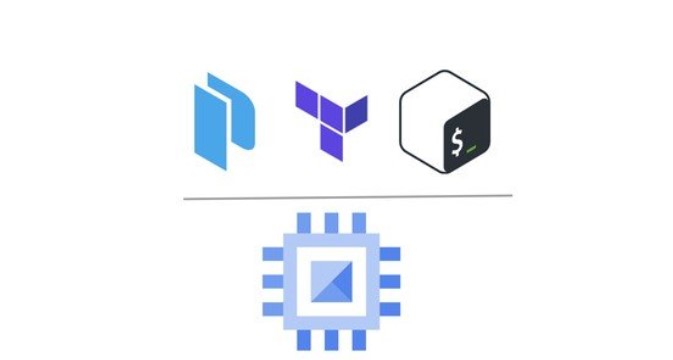Google Cloud Gce Reliability Engineering Using Terraform
Original Price: $19
Yours FREE DOWNLOAD!!!
Author: Jai Chenchlani
Sale Page :_https://www.udemy.com/course/google-cloud-gce-reliability-engineering-using-terraform/
10 stages of maturity of running apps in Google Cloud GCE with Terraform and Reliability Engineering principles.
What you’ll learn
GCP Overview – Compute, Containers, Storage and Observability
GCE | Google Compute Engine – In-depth understanding, use cases and best practices
GCE best practices | concepts and implementation
Running production grade apps in GCE | 10 Stages of maturity
Provisions GCE resources using GCP Console
Provisions GCE resources via CLI using gcloud
Building compute images using Packer
IaC – Provisions GCE resources using Terraform
Apply Reliability Engineering principles to avoid single points of failure
Run a website with Observability in GCE with best practices incorporated
Grafana – One of the most popular visualization/monitoring tool
Requirements
A Mac or PC computer with access to the internet
No paid software required – we will use GCP free tier
High level understanding of GCP and the services it offers
Basic understanding of Terraform will help, although not a show-stopper
Description
Welcome to the Google Cloud | GCE Reliability Engineering using Terraform, the only course you need to get ready to be a rockstar Google Compute Engine expert.With ~5 hours of lectures, demos packed with industry experience, this course is without a doubt the most comprehensive GCE course available anywhere online. Even if you have zero understanding of running an app in GCE, this course will take you from a novice to a pro levels of proficiency. Here are the reasons why:- The course is taught by an industry expert on the subject, who is a daily practitioner himself.- The course has been updated to be 2023 ready and you’ll be learning the latest tools and technologies used at large companies running their applications on Google Cloud.- The curriculum was developed over a period of 1 year, after a dry-run of the content with a private group of students. – The course is constantly updated with new content, with new projects and modules determined by students – that’s you!We’ll take you step-by-step through engaging video tutorials and teach you everything you need to know to succeed as a platform engineer running apps on GCEThe course includes around 5 hours of HD video tutorials and builds your expertise that enables you to be productive on the job.Throughout this course, we cover the 10 stages of maturity for running apps in GCE. Below are the 10 stages that I will handhold you through.- Stage 1 | Manual actions via GCP console- Stage 2 | Enable logging- Stage 3 | Use of Startup Scripts- Stage 4 | Complete automation using Bash scripts- Stage 5 | Automation using Packer built images- Stage 6 | IaC | Provision infrastructure using Terraform- Stage 7 | Create instances(VMs) from Instance Templates- Stage 8 | Reliability Engineering | Managed Instance Groups(MIG)- Stage 9 | Reliability Engineering | Load Balancer- Stage 10 | Remove External IPs and configure Cloud NAT and DNSBy the end of this course, you will be confident about running/hosting any kind of app on GCE – Google Compute Engine.Sign up today, and look forward to:- Video Lectures- Hands-on Demos- Resources and Cheatsheets- DownloadsREMEMBER. I’m so confident that you’ll love this course that we’re offering a FULL money-back guarantee for 30 days! So it’s a complete no-brainer, sign up today with ZERO risk and EVERYTHING to gain.This course is the best way to get ready to rock day 1 on the job in Google Compute Engine.Don’t waste any more time wondering what course is best for you. You’ve already found it. Get started right away!
Overview
Section 1: Introduction
Lecture 1 Instructor Introduction
Lecture 2 Instructor Coordinates
Lecture 3 Agenda
Lecture 4 GCP Free Tier Account and Initial Setup
Section 2: Introduction to GCP and GCE
Lecture 5 GCP Overview
Lecture 6 GCE – Google Compute Engine – Overview and Use Cases
Lecture 7 GCE Best Practices
Section 3: Demo | Introduction
Lecture 8 The 10 Stages of maturity or running apps in GCE
Lecture 9 Demo Apps – 2 Static HTML Websites and Grafana
Lecture 10 alias/commands frequently used throughout the course
Section 4: Stage 1 | Manual actions via GCP Console
Lecture 11 Steps involved and relevant commands
Lecture 12 Demo – Part 1 | Introduction
Lecture 13 Demo – Part 2 | Create VM CentOS
Lecture 14 Demo – Part 3 | Create VMs Debian
Lecture 15 Demo – Part 4 | Install Apache Webservers
Lecture 16 Demo – Part 5 | Install Grafana
Lecture 17 Demo – Part 6 | Configure Websites
Lecture 18 Demo – Part 7 | Configure Grafana
Lecture 19 Demo – Part 9 | Conclusion
Section 5: Stage 2 | Enable Logging
Lecture 20 Steps involved and relevant commands
Lecture 21 Demo – Part 1 | Introduction
Lecture 22 Demo – Part 2 | Install logging agent google-fluentd on debian
Lecture 23 Demo – Part 3 | Install logging agent google-fluentd on centos
Lecture 24 Demo – Part 4 | Validates our website logs from VMs in Cloud Logging and Grafana
Section 6: Stage 3 | Automate Initial Setup using Startup Scripts
Lecture 25 Introduction
Lecture 26 Startup Script | Centos | statichtml website
Lecture 27 Startup Script | Debian | statichtmlwithjs website
Lecture 28 Startup Script | Debian | Grafana
Lecture 29 Demo – Part 1 | Create VMs using Startup Scripts
Lecture 30 Demo – Part 2 | Resolving issue with Grafana VM
Lecture 31 Conclusion
Section 7: Stage 4 | Complete Automation using Bash Scripts
Lecture 32 Introduction
Lecture 33 Setup Variables for gcloud commands
Lecture 34 gcloud command to create VMs with startup script
Lecture 35 Create VMs
Lecture 36 Conclusion
Section 8: Stage 5 | Introducing Packer
Lecture 37 Introduction
Lecture 38 Install Script vs Startup Script
Lecture 39 Packer Configuration | statichtml CentOS
Lecture 40 Packer Configuration | statichtmlwithjs Debian
Lecture 41 Packer Configuration | Grafana Debian
Lecture 42 Build Packer Images
Lecture 43 Packer Commands
Lecture 44 Create VMs using Packer Images
Lecture 45 Troubleshoot issue with Debian VM
Lecture 46 Conclusion
Section 9: Stage 6 | Introducing Terraform
Lecture 47 Introduction
Lecture 48 Reference
Lecture 49 Reference Overview
Lecture 50 Demo Part 1 | Terraform Configuration Files
Lecture 51 Demo Part 2 | Provision Infrastructure
Lecture 52 Conclusion
Section 10: Stage 7 | Instance Templates
Lecture 53 Introduction
Lecture 54 Demo
Lecture 55 Conclusion
Section 11: Stage 8 | Managed Instance Groups (MIGs)
Lecture 56 Introduction
Lecture 57 Demo Part 1 | Terraform Configuration
Lecture 58 Demo Part 2 | Provision Resources
Lecture 59 Conclusion
Section 12: Stage 9 | Load Balancers
Lecture 60 Introduction
Lecture 61 Create Load Balancer via GCP Console
Lecture 62 Create Load Balancer via Terraform Scripts
Lecture 63 Conclusion
Section 13: Stage 10 | No external IP | Cloud NAT | DNS
Lecture 64 Introduction
Lecture 65 Command Reference
Lecture 66 Demo – Part 1 | Issue with Stage 9
Lecture 67 Demo – Part 2 | Remove Instance External IP, Implement Cloud NAT
Lecture 68 Demo – Part 3 | Configure DNS
Lecture 69 Conclusion
Section 14: Recap
Lecture 70 Recap
Google Cloud Gce Reliability Engineering Using Terraform: Video, PDF´s
Download from rapidgator.net
Google_Cloud_GCE_Reliability_Engineering_using_Terraform.part1.rar
Google_Cloud_GCE_Reliability_Engineering_using_Terraform.part2.rar
Download from Nitroflare
Google_Cloud_GCE_Reliability_Engineering_using_Terraform.part1.rar
Google_Cloud_GCE_Reliability_Engineering_using_Terraform.part2.rar
==> Download From Mega.: (FREE DOWNLOAD)

***If link dead, please leave a message,or to send message to a ebusinesstores@gmail.com We will update immediately***



What happened to this website? It used to be good. Frequent updates, an admin would quickly respond to requests and upload to Mega links, but now nothing? Weird.